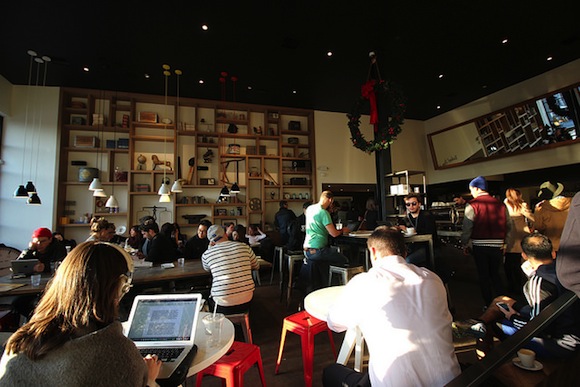
Last year, Brokelyn told you how not to be a dick when camping out in a coffee shop. This year though, you might be finding it hard to camp out at all. Freelancers and work-from-homers are becoming a serious epidemic in coffee shops across the borough — which has led, in turn, to the increased prevalence of limited wifi, the kind that kicks you off the network after a certain window of use.
Stores like Whole Foods and, until recently, Starbucks, have long benefited from limited-use hotspots for crowd control (even if they don’t always know it), but now we’re seeing it pop up throughout independent coffee shops in Brooklyn. And while it’s easy to guess how freelancers feel about limited wi-fi access, we wanted to get the skinny from the shop owners who offer it. So we asked two of BK’s busiest cafés, Bed-Stuy’s Bedford Hill Coffee Bar, and Fort Greene’s Greene Grape Annex, to share how they felt about their customer base of the remotely-employed, who come in looking for a co-working space that feels like a café.
“Coffee shops to me are about community,” Bedford Hill owner Allison Stuart told us. “It’s fine if freelancers want to come in, buy something and use the wifi, but that’s not the larger purpose.”
Bedford Hill (343 Franklin Ave.) has always offered limited wi-fi access via single-use codes, and has a “no laptops” policy on weekends. Stuart knows that new and uninitiated customers often get frustrated about having to ask for coded slips like they’re secret passwords, but she stands by an unspoken ‘one coffee, one hour’ etiquette for the wi-fi.
_______________
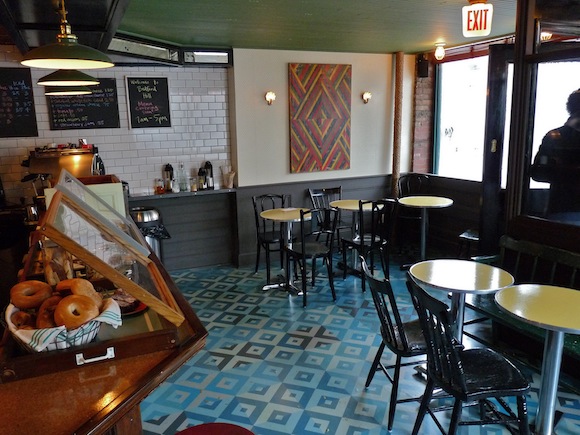
“We only have 12 tables and it’s important to have the tables turn over,” Stuart said. “I’m happy to provide internet, but realistically the business can’t afford to have a customer sitting all day on one cup of coffee.”
The Greene Grape Annex (753 Fulton St.) hasn’t always had timed wifi. They introduced it at the end of 2015, and with good reason. Whether word spread about Annex’s speedy connection, or it was just by dint of the café’s central location near Atlantic Center, the shop had been suffering from markedly absurd amounts of laptop squatters, much to the chagrin of occasional customers and regulars alike:
@GGProvisions : Can I ask for a BAN on the effing laptops in the Annex Sunday mornings?” No space for coffee & chats. pic.twitter.com/PJN4hx7tLB
— Roma van der Walt (@chittabox) February 22, 2015
We caught up with Annex’s general manager Steve Pellegrino, who was happy to explain the shop’s decision to limit wi-fi access.
“Our current location is more than twice the size of our original cafe,” he said. “And we were very excited to offer a creative space for the neighborhood that has supported our business for so many years. We wanted that space to welcome as many guests as possible. And often times, customers would just lose track of time and not realize how long they had been working. While we’re all for productivity, one of the downsides to this was seeing new customers walk in on a busy day, see that there were no seats available, and turn away to possibly never return. Our decision was prompted by the notion that there had to be some kind of happy medium.”
_______________
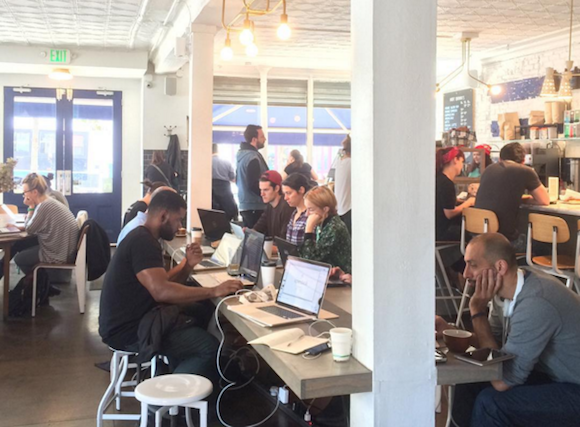
For Stuart, the issue with wifi isn’t just a dollar figure. It has more to do with how blue screens and studious freelancers impose upon an otherwise community setting, subduing customer conversations to a library-like hush and preventing organic interactions from taking place.
“Looking outside of the computer screen, and meeting staff and other patrons, it rounds out the whole experience,” Stuart said. “People could meet their future lover, best friend, potential job opportunity, or just have a momentary connection that makes life rich.”
And it isn’t only the screens that prevent those momentary connections: neither Stuart nor Pellegrino felt there was much of a difference between laptop users and the hermits who bring a book to read for five hours over a single coffee.
“There really is no difference when to it comes to the bottom line,” said Pellegrino. “Someone seeing a café full of laptops reminds them of work, while [seeing people] reading books seems much more leisurely on the surface. In the end, all of the customers are there for the same basic reason.”
But what is that “basic reason?”
_____________
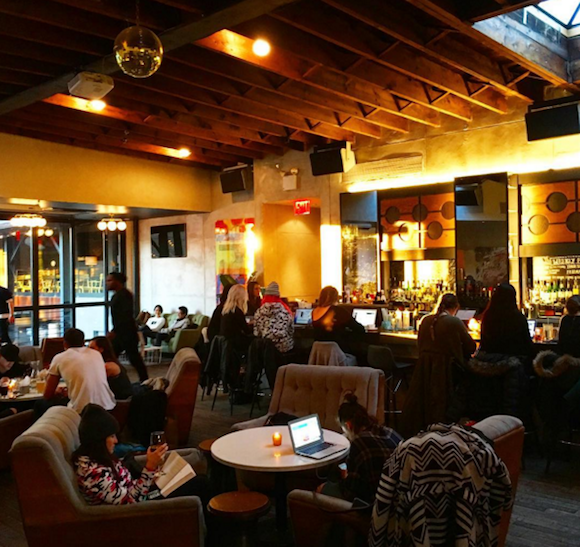
As a freelancer, my personal hell is walking into a coffee shop anywhere in Brooklyn and seeing it stuffed to the seams with laptop users. It’s not just the absence of space that bothers me — I’m part of the problem, after all — but more that seeing a room full of people who aren’t talking to each other reminds me of the life I’m not living, the conversations I’m not having, and the connections I’m not making with other human beings.
It’s absurd that we’re this deeply reliant on technology, and yet we haven’t figured out how to work symbiotically with spaces like coffee shops, to give and take from each other what we need. (I’m not talking about outlets.) Time and time again, freelancers choose coffee shops over co-working spaces which, if you do the math, might actually be a lot cheaper with all the free coffee. Why do we prefer these public private spaces? Is it because we’re lonely, and there’s scientific proof that we enjoy the soothing white noise of other lonely people too? Is it because we’re secretly hoping someone will interrupt our workflow to ask us on a date? Or is it just because we’re fundamentally confused about how this delicate ecosystem of consumer and business should sustain us?
Pellegrino expressed a simple desire for customers who rely on café wifi: to be more self-aware and sympathetic with those around them — including the staff who work behind the counter.
“Many of our staff members are pursuing other creative and non-traditional careers, too,” he said, “[and those careers] often require a work space that doesn’t come with all the distractions of working at home. The reason for using the service we decided on was to have the system be self-policing. It reminds the customer how long they’ve been working, and they can decide if they would like to continue working. That to me is the ideal, for any job really, whether freelance, from home or an office: to remind yourself to unplug after a bit. And maybe even grab a beer.”
Follow Sam on Twitter for more stories to sip on, at @ahoysamantha![]() .
.
3 Comments
Leave a Reply

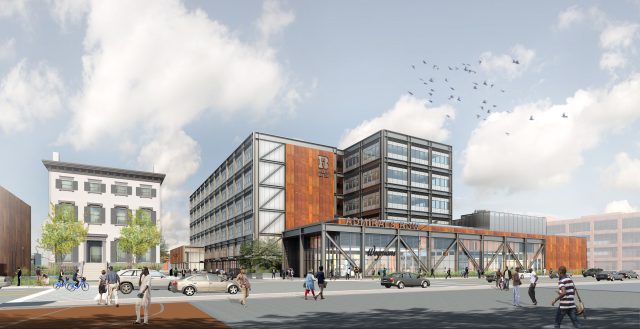
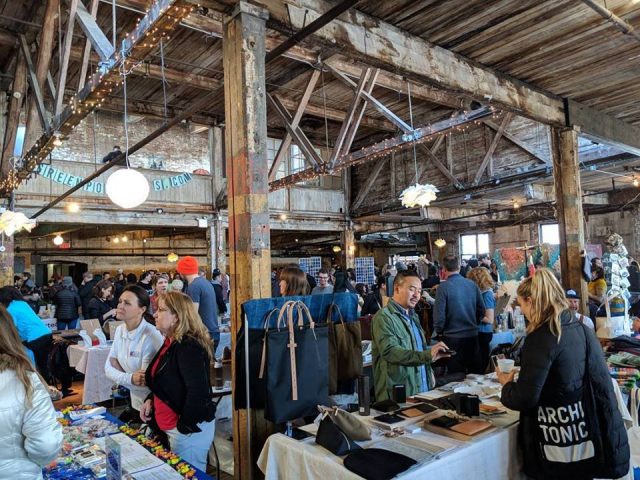
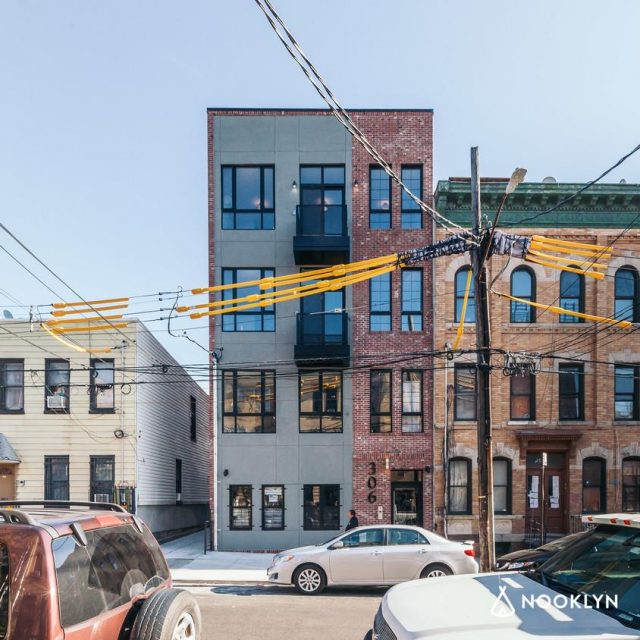
laptop spreading! (sorta)
LANspreading
It’s so depressing and disconcerting being the only person in a cafe not gawking into a laptop. It’s why I avoid the Atlas Cafe (and many others!). I’d almost rather sit at home drinking coffee alone than sit among a crowd of people whose faces you never see and with whom you can’t interact.